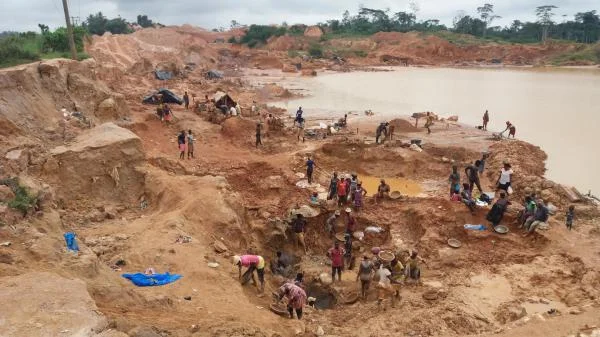Galamsey Threatens Water Supply in Central Region
The critical issue of galamsey has hindered water treatment processes, forcing GWCL to adopt more costly and intensive measures to address the contaminated water supply.
- Advertisement -
The impact of illegal mining, commonly known as galamsey, continues to devastate communities in the Central Region, with the Ghana Water Company Limited (GWCL) cutting water production by 30% due to the ongoing crisis.
The reduction in water production follows widespread environmental damage to water bodies, farmlands, and forest resources, leading to significant declines in food and cocoa production.
- Advertisement -
In response to the severe contamination of raw water sources, particularly along the banks of the Pra River, GWCL has been forced to scale back operations at its Sekyerehemang Water Treatment Plant (WTP).
- Advertisement -
The company cited a disturbing increase in turbidity levels, reaching 14,000 NTU instead of the recommended 2,000 NTU for effective treatment. As a result, the plant currently operates at only 25% of its capacity, producing approximately 7,500 m3/day.
The community of Elmina, Cape Coast, and surrounding areas are directly impacted by this water shortage, exacerbating the strain on essential resources, especially during the Fetu Afahye festival in Cape Coast. Residents have been urged to report any illegal mining activities to local authorities to curb the galamsey menace.
Despite previous promises by President Akufo-Addo to tackle illegal mining, the situation persists, with reports suggesting a lull in the government’s efforts due to the upcoming election cycle.
The critical issue of galamsey has hindered water treatment processes, forcing GWCL to adopt more costly and intensive measures to address the contaminated water supply.
- Advertisement -
To address the pressing challenges caused by galamsey activities, GWCL is engaging communities along the Pra River to raise awareness of the detrimental effects of illegal mining on water sources.
The company emphasizes the urgent need for collective action to protect water bodies and promote sustainable water management practices. The severity of the situation has prompted the GWCL to prioritize dredging and desilting the Pra River to improve water quality for treatment.
The chief manager of the company, Eric Seth Atiapah, acknowledged the detrimental impact of high turbidity levels on water treatment processes, necessitating a 30% reduction in production to accommodate the treatment of the compromised water.
As the Central Region grapples with the consequences of galamsey, environmental experts warn of the long-term implications of the ongoing environmental degradation.
The excessive silt and pollution in water sources pose significant challenges for water treatment, requiring heightened vigilance and community engagement to combat illegal mining activities and safeguard precious water resources.
Source: whatsupnewsghana
- Advertisement -


